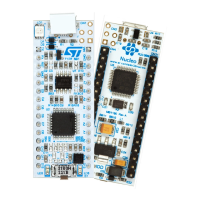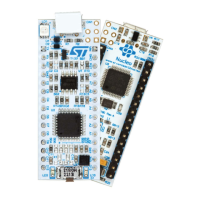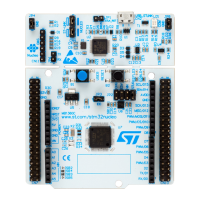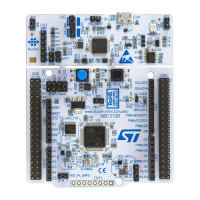UM1724 Rev 14 25/68
UM1724 Hardware layout and configuration
67
Note: For NUCLEO-L476RG and NUCLEO-L452RE the ST-LINK MCO output is not connected to
OSCIN to reduce power consumption in low power mode. Consequently, NUCLEO-L476RG
and NUCLEO-L452RE configurations correspond to HSE not used.
6.7.2 OSC 32 kHz clock supply
There are three ways to configure the pins corresponding to the low-speed clock (LSE):
• On-board oscillator: X2 crystal. Refer to the Oscillator design guide for STM8S,
STM8A and STM32 microcontrollers application note (AN2867) for oscillator design
guide for STM32 microcontrollers.It is recommended to use ABS25-32.768KHZ-6-T,
manufactured by Abracon Corporation.
• Oscillator from external PC14: from external oscillator through the pin 25 of CN7
connector.
The following configuration is needed:
– SB48 and SB49 ON
– R34 and R36 removed
• LSE not used: PC14 and PC15 are used as GPIOs instead of low-speed clocks.
The following configuration is needed:
– SB48 and SB49 ON
– R34 and R36 removed
There are three possible default configurations of the LSE depending on the version of the
STM32 Nucleo board hardware.
The board version MB1136 C-01 or MB1136 C-02 is mentioned on the sticker placed on the
bottom side of the PCB.
The board marking MB1136 C-01 corresponds to a board configured as LSE not used.
The board marking MB1136 C-02 (or higher) corresponds to a board configured with
on-board 32 kHz oscillator.
The board marking MB1136 C-03 (or higher) corresponds to a board using new LSE crystal
(ABS25) and C26, C31, and C32 value update.
6.8 USART communication
The USART2 interface available on PA2 and PA3 of the STM32 microcontroller can be
connected to ST-LINK MCU, ST morpho connector, or to ARDUINO
®
connector. The choice
can be changed by setting the related solder bridges. By default, the USART2
communication between the target STM32 and ST-LINK MCU is enabled, in order to
support virtual COM port for Mbed™ (SB13 and SB14 ON, SB62 and SB63 OFF). If the
communication between the target STM32 PA2 (D1) or PA3 (D0) and shield or extension
board is required, SB62 and SB63 must be ON, while SB13 and SB14 must be OFF. In such
a case, it is possible to connect another USART to ST-LINK MCU using flying wires between
the ST morpho connector and CN3. For instance, on NUCLEO-F103RB it is possible to use
USART3 available on PC10 (TX) and PC11 (RX). Two flying wires need to be connected as
follow:
• PC10 (USART3_TX) available on CN7 pin 1 to CN3 pin RX
• PC11 (USART3_RX) available on CN7 pin 2 to CN3 pin TX

